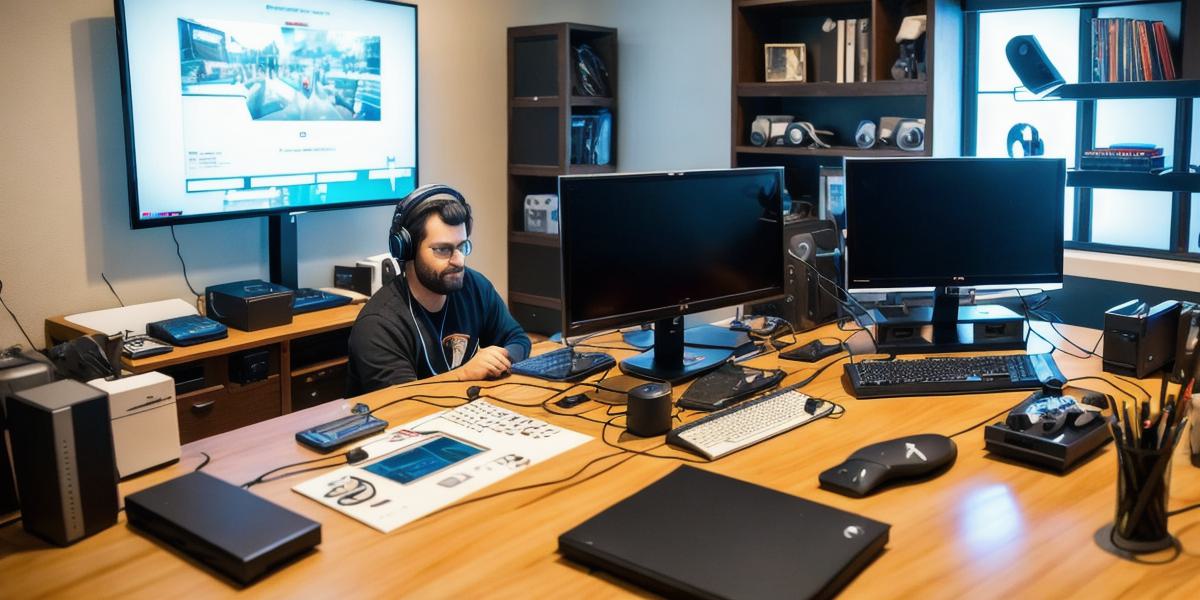The gaming industry has grown rapidly over the past decade, with video game sales reaching a record $120 billion in 2020. This growth has led to an increase in demand for skilled game developers, who are responsible for creating and designing immersive gaming experiences. However, despite the growing popularity of the industry, there are still many questions about whether game developers are truly satisfied with their career path. In this article, we will explore the topic of game developer satisfaction and examine the various factors that contribute to it.
Introduction
Before we dive into the world of game development, let’s take a moment to understand what it is and why it matters. Game development involves creating video games, from conceptualization to design, programming, and testing. This process requires a range of skills, including creativity, technical expertise, and attention to detail.

The gaming industry has grown exponentially over the past decade, with more people playing video games than ever before. In 2021, it was estimated that there were approximately 4.7 billion gamers worldwide, up from 3.5 billion in 2019. This growth has led to an increase in demand for skilled game developers, who are responsible for creating the immersive gaming experiences that keep players engaged and entertained.
In this article, we will explore the topic of game developer satisfaction and examine the various factors that contribute to it. We will also examine case studies and personal experiences from game developers to gain a deeper understanding of their opinions on the matter.
The Benefits of a Career in Game Development
Before we delve into the topic of game developer satisfaction, let’s take a moment to understand the benefits of a career in game development. There are many reasons why people choose this career path, including:
- High Demand
The gaming industry is growing rapidly, and there is a high demand for skilled game developers. With more people playing video games than ever before, there is a constant need for new and innovative gaming experiences. This means that game developers have a lot of job security and are in high demand.

- Creative Freedom
Game development offers a great deal of creative freedom, as game designers have the opportunity to bring their ideas to life. They can work on creating immersive worlds, designing characters, and creating unique gaming experiences that will captivate players.
- Competitive Salary
The gaming industry is known for offering competitive salaries to skilled game developers. According to Glassdoor, the average salary for a game developer in the United States is around $108,000 per year. This is significantly higher than the average salary for many other careers.
- Opportunities for Growth
The gaming industry offers many opportunities for growth and development. Game developers have the opportunity to work on different types of games, from sports games to role-playing games, and can specialize in a particular area of game development. This allows them to continue learning and growing throughout their careers.
Factors Affecting Game Developer Satisfaction
Now that we have a better understanding of the benefits of a career in game development let’s examine the various factors that affect game developer satisfaction. There are many factors that can contribute to a game developer’s level of satisfaction with their job, including:
- Work-Life Balance
Work-life balance is becoming increasingly important in the gaming industry. Many game developers work long hours and have a high level of stress due to tight deadlines and intense pressure to deliver quality products. This can lead to burnout and decreased satisfaction with their job.
- Company Culture
Company culture plays a significant role in game developer satisfaction. A positive company culture can provide a supportive environment where game developers feel valued and respected. On the other hand, a toxic company culture can lead to decreased motivation and job satisfaction.
- Creative Freedom
As mentioned earlier, creative freedom is a major benefit of a career in game development. However, if game developers are not given the creative freedom they need to bring their ideas to life, this can lead to dissatisfaction with their job.
- Job Security
Job security is becoming increasingly important in the gaming industry. With more people playing video games than ever before, there is a high demand for skilled game developers. However, if game developers feel that their job is not secure, this can lead to decreased satisfaction and motivation.
- Monetary Rewards
Finally, monetary rewards play a significant role in game developer satisfaction. While the gaming industry offers competitive salaries, game developers may still feel that they are not being rewarded adequately for their hard work and dedication. This can lead to decreased motivation and job satisfaction.
Case Studies and Personal Experiences
Now that we have a better understanding of the factors that affect game developer satisfaction, let’s examine some case studies and personal experiences from game developers to gain a deeper understanding of their opinions on the matter.
- The Importance of Work-Life Balance
One game developer, Sarah, has been working in the gaming industry for over five years. She started out as a junior game designer and has since worked her way up to a senior role. Sarah has always struggled with work-life balance, often working long hours and missing important events due to tight deadlines. This has led to burnout and decreased satisfaction with her job.
"I love my job, but it can be really tough sometimes," says Sarah. "Working long hours and missing important events can take a toll on your mental health and overall well-being. It’s important for game developers to find a balance between work and their personal lives, otherwise, they risk burnout."
- The Importance of Company Culture
Another game developer, John, has been working in the gaming industry for over ten years. He started out as a junior programmer and has since worked his way up to a senior role. John has always valued positive company culture and believes that it plays a significant role in game developer satisfaction.
"A positive company culture can make all the difference," says John. "When you work in an environment where you feel valued and respected, it makes you more motivated and satisfied with your job. It’s important for companies to invest in their employees and create a supportive environment."
- The Importance of Creative Freedom
A third game developer, Jane, has been working in the gaming industry for over seven years. She started out as an artist and has since worked her way up to a senior role. Jane believes that creative freedom is essential for game developers and has always felt frustrated when she has not been given the freedom to bring her ideas to life.
"Creative freedom is what makes game development so rewarding," says Jane. "When you are allowed to bring your ideas to life, it’s incredibly fulfilling. However, if companies try to stifle creativity or limit your ability to express yourself, it can be really demotivating."
- The Importance of Job Security
Finally, a fourth game developer, Michael, has been working in the gaming industry for over eight years. He started out as a junior programmer and has since worked his way up to a senior role. Michael believes that job security is becoming increasingly important in the gaming industry and that it can have a significant impact on game developer satisfaction.
"Job security is essential in the gaming industry," says Michael. "With more people playing video games than ever before, there is a high demand for skilled game developers. However, if companies are constantly downsizing or outsourcing work, it can be really stressful and lead to decreased job satisfaction."
Conclusion
In conclusion, the gaming industry offers many benefits for game developers, including competitive salaries, creative freedom, and job security. However, there are also several factors that can contribute to a game developer’s level of satisfaction with their job, including work-life balance, company culture, creative freedom, job security, and monetary rewards. By understanding these factors and taking steps to address any issues that arise, companies can help ensure that their game developers remain motivated and satisfied with their jobs.



